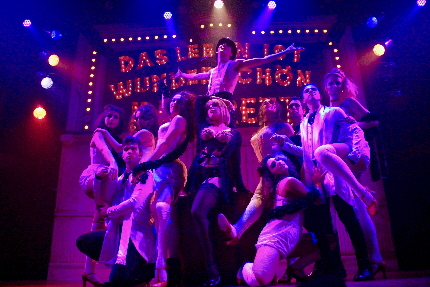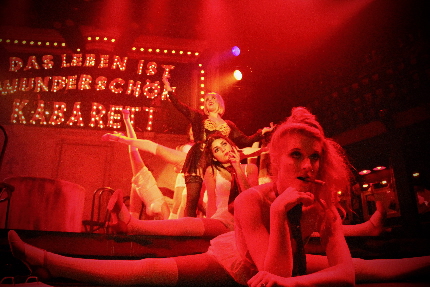
Giorgio Volpe as the emcee and Marilyn Caserta, center front, as Sally willkomen you to Cabaret at Area Stage Company
By Bill Hirschman
The last sung words in Area Stage Company’s spin on Cabaret — as projected footage of a bombed-out Berlin gives way to the dead piled in concentration camps – the last words are “à bientôt….”
That cheery French phrase translates roughly into “See you soon.”
In recent productions, it is sung ironically as the characters march off to the ovens. But in this edition, it underscores with equally fiery emphasis how this warhorse musical still serves, not as a cautionary tale, but as a flat out warning to our current socio-political climate: This can happen again.
The 1966 masterpiece, reconceived in Sam Mendes’ landmark 1993 revival, assaults a 2018 audience with deafening resonances about accommodation, acquiescence, fear, denial, greed, self-centeredness, self-deception, bigotry and xenophobia, all easily recognizable from CNN or You Tube.
John Rodaz’s production borrows a few of Mendes’ punkish touches and Rebecca Ashton’s choreography borrows flashes of Rob Marshall. But both, along with musical director Katie Duerr, invest their own vision to inject a decided freshness to this endlessly produced work. That forces even veteran audiences to appreciate the aforementioned themes with renewed discomfiture.
A few elements of the production and performances are not as strong, but it can boast solid portraits from Marilyn Caserta as Sally and Giorgio Volpe as the Emcee, plus a mostly strong supporting cast, a committed ensemble, and a fine live nine-piece band (that’s not an error, nine). All this registers Cabaret as one of Area Stage’s most impressive productions since the conservatory-centric company began mounting adult professional theater as it used to on Lincoln Road.
The story has been told and retold, starting with Christopher Isherwood’s original 1939 short novel, then John Van Druten’s 1951 play starring Julie Harris, then the startlingly ground-breaking musical by John Kander, Fred Ebb, Joe Masteroff and director Harold Prince, and the Oscar-winning 1972 film by Bob Fosse that cemented Liza Minnelli’s stardom – each different than the previous edition.
Each is set in Depression-wracked 1931 Berlin. Each uses the debauched live-for-today ethos of a seedy third-rate cabaret as a metaphor for Germans’ willful blindness and passive enabling of the rise of Nazism exploiting anti-Semitism. Between vaudeville numbers led by a leering Master of Ceremonies, the musical tracks the relationship between Cliff, an American novelist stymied with writers’ block, and Sally, a British equally-third-rate chanteuse who doggedly pursues a hedonistic lifestyle. As the fascist movement swells, Cliff alone realizes that the indulgent insulated life cannot and morally should not survive.
Over and over, Rodaz’s production and the material itself intentionally or unintentionally strikes contemporary parallels that offer an unnerving look into a possible future rather than a documentable past.
The musical staging by Rodaz and Ashton is vibrant and appropriately as uninhibitedly sexually-drenched as Fosse’s most carnal work in Pippin and his film All That Jazz. Echoing a manual of sexual positions, there is considerable butt-slapping, crotch pumping and people sliding between someone else’s open legs. Unfortunately, the staging turns pedestrian during the book scenes with characters mostly lined up in a single plane, often talking to each other in perpetual profile.
Caserta makes a fascinating Sally, a role she played for Area Stage in its student production six years ago. Visually, she looks like a kewpie doll with shining needy eyes and effusive energy. Emotionally, Caserta bravely tracks Sally’s arc from carefree cluelessness to deterioration into tortured denial. Her initial numbers are performed with undiluted joy of someone who savors the status of being the headliner at a popular club, totally ignorant that her talent is limited and the venue is tawdry. Caserta’s clarion voice belts “Don’t Tell Mama,” and her “Mein Herr” scorches the auditorium walls. Indeed, we don’t intuit Sally’s troubled backstory until much later, possibly later than it should be apparent. But when Sally sings “Maybe This time,” Caserta drops Sally’s mask and we see her profound need for love and this terrified stab at hopefulness — a traitorous emotion in her past.
Working with Rodaz and Duerr, she delivers the title number precisely as it should be: an agonized cry of someone desperately trying to block out the truth, not some jubilant celebration as so many pop renditions have criminally twisted it into. During the course of the song, Caserta morphs from writhing in the vise of encroaching truths to a fierce affirmation of what she knows is a doomed choice.
Actor Alan Cummings and Mendes’ reinvention of the omnisexual Emcee role continues to be so iconic that it is impossible to escape completely. But while Volpe, Rodaz and Ashton have retained the smarm and sleaze of that vision, they have added a different spin. Volpe creates a creature endemic to this no-limits environment, but he occasionally lets slip a glimmer of separateness. Volpe’s Emcee gladly exploits his patrons’ cupidity and venality, but he barely hides a disdainful anger at their willingness to lose themselves as self-indulgent suicidal sheep. Physically, Volpe moves with sinuous salaciousness, verve and panache. His voice is a bit thin when singing in the higher ranges, but his ballad “I Don’t Care Much” (in which Volpe makes clear the Emcee does indeed care) is delivered with a rich gin-and-tonic lounge voice.
Ryan Bauta, who was so good a few months ago as the title character in Area Stage’s Shrek, is just adequate as Cliff, lacking quite the credibility and charisma to pull off this notoriously underwritten role that is supposed to be the fulcrum of the piece.
The rest of the cast includes Isabelia Duran, a standout as the tragically pragmatic Fraulein Schnieder, the veteran David Kwiat giving a patented performance as the endearing Herr Schultz and Michael Leyte-Vidal as the secretly nascent Nazi Ernst.
Doubling in small acting parts are ensemble-dancers you wouldn’t bring home to mother including June Raven Romero, Marialexia Hernandez, Valeria di Babbo, Victoria Mesa, Jennifer Fain, Farid Milan, Brian Piedra, Luis Ibarra, David Caserta, Michelle Gordon, Zelda Rosenberg and Ashton.
Musical director Duerr, who convincingly doubles as the hardened prostitute Fraulein Kost, smoothly molded the performers’ voices and insisted on clear enunciation of the lyrics.
The band led by keyboardist Rick Kaydas expertly negotiates the eclectic score ranging from the raucous Dixieland to tender waltzes. He’s joined by Frank Capoferri, Steven Eckert, Peter Francis, Julie Jacobs, Yirka Ledn, Greg Minnick, Wayne Schiferl and Samuel Valancy.
The two-story set design by Rodaz, with lighting and sound by son Giancarlo, flows across the company’s unusually wide stage with the Kit Kat Club dancers’ dressing rooms bordering the playing area. The band is visible in an attic through a large marquee of garish electric bulbs spelling out “Das Leben Ist Wunderschon Kabarett” (The Life Is Wonderful Cabaret). Light and sound cues were a bit late opening night and the theater could use a few more lights out in the auditorium to illuminate the front of its actors.
The evocative costuming by Maria Banda-Rodaz is another strength with the “real world” characters convincingly dressed in layered period wear, but she has let her imagination free for the cabaret performers’ garb. The Emcee enters wearing a black leather duster of sorts, black bowler and ebony pants covered by strange loose lace. The chorus line are dissolute hookers dressed in bizarrely pure white little girl nighties and underwear.
A few weeks ago, I wrote how I’d be just as happy not to see another Cabaret for a while. Shut my mouth.
Cabaret runs through Aug. 26 at Area Stage Company, 1560 S. Dixie Highway, Coral Gables. 7:30 p.m. Friday and Saturday, 2 p.m. Saturday, 5 p.m. Sunday. Runs 2 ½ hours with one intermission. Tickets cost $20-$45. Call (305) 666-2078 or visit areastagecompany.com.










 A PaperStreet Web Design
A PaperStreet Web Design
